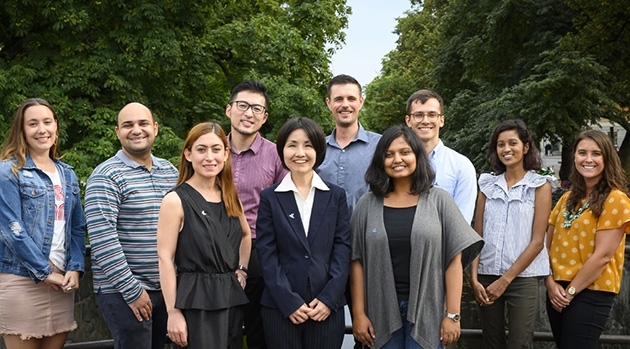International collaboration elevates Peace and Conflict Studies
The appointment to the Rotary Peace Center has raised Uppsala University’s already attractive Master’s programme in Peace and Conflict Studies to the very highest level. In January Master’s student Afaf Doleeb received the Martin Henriksson Holmdahl Prize for her involvement in Sudan’s democratic development.
Afaf Doleeb, a Master’s student in Peace and Conflict Studies, has been awarded the Martin Henriksson Holmdahl Prize, Uppsala University’s top honour for efforts to promote human rights and freedoms. The explanatory statement emphasises Afaf Doleeb’s great commitment to the peaceful protest movement, which was crucial for Sudan’s democratic development towards rule based on human rights. Doleeb is currently one of 18 Rotary Peace Scholars based in Uppsala, and during her time with the programme, she has played a key role in the formation of a Facebook group that monitors the Sudanese government’s compliance with the agreements it has entered into.
“Doleeb’s work is both impressive and courageous during a period that is so important for Sudan,” says Sara Lindberg Bromley, director of the Uppsala Rotary Peace Center. “Her efforts also show how closely linked our disciplinary research domain is to current events in conflict areas and how our students’ experiences can provide important knowledge to our student group.”
Scholarship holders from around the world
In 2011 Rotary International named Uppsala University the world’s sixth international Peace Center. The appointment, which was obtained in competition with several of the world’s highest-ranking universities, means that each year about 10 scholarship holders from around the world begin Uppsala’s highly selective Master Programme in Peace and Conflict Studies. The number of applicants per scholarship is high, and the selection process meticulous.
“Each applicant is to have at least three years of experience in practical peace work, a strong commitment to international peace, leadership potential and detailed reasons for wanting to study at our particular programme. After Rotary has made an initial selection, we choose from among the 200 strongest applications with the aim of forming a diverse group in which each participant contributes different experiences. Once in place, the presence of the scholarship recipients enriches the education for everyone, and we also have the benefit of drawing on Rotary’s large network to provide opportunities that benefit all students, such as welcoming foreign guest lecturers to the programme,” says Lindberg Bromley.
Important for the future
During their two years at Uppsala Rotary Peace Center, the scholarship holders also participate in activities in addition to the regular schedule. These include an Applied Field Experience held in the summer months after the first year of study. Each scholarship holder then participates in peace-promoting activities anywhere in the world based on a self-formulated project plan. In addition to a valuable contribution, it provides an opportunity for each participant to make contacts and to specialise in preparation for their future career.
“I devoted my Applied Field Experience to developing peace education programmes in Rwanda together with Never Again Rwanda, an NGO focused on social justice,” says Afaf Doleeb. “The experience made me realise how complicated it is to build peace and how the combination of academic and local approaches can make all the difference. It was a unique experience that helped me decide what I want to do in my future career.”
Working for peace after a degree
Among the scholarship holders who have already obtained their 120-credit Master’s degree at Uppsala University, many have chosen to work in non-governmental peace-building organisations, several of them working close to conflict areas. Others have chosen to build on their academic qualifications, including a couple who have returned to Uppsala for doctoral studies at the Department of Peace and Conflict Research.
“Today there are more than a thousand Rotary Peace Fellows in the wider network, which can also open significant doors for the other students in our programme,” Lindberg Bromley states. “As the Rotary Peace Center, we work closely with the other selected higher educational institutions to continuously develop both the selection process and the programme as a whole, so our collaboration with Rotary is truly a contribution that benefits us all.”
Facts
- The Master Programme in Peace and Conflict Studies provides knowledge on conflict management and how peace and justice can be promoted at national and global levels.
- Uppsala Rotary Peace Center selects and educates Rotary Peace Fellows with the aim of helping them have a significant, positive impact on peace and conflict resolution in their future careers.
- The Martin Henriksson Holmdahl Prize for human rights and freedoms was instituted by Uppsala University in 2003 as a tribute to its former vice-chancellor.

